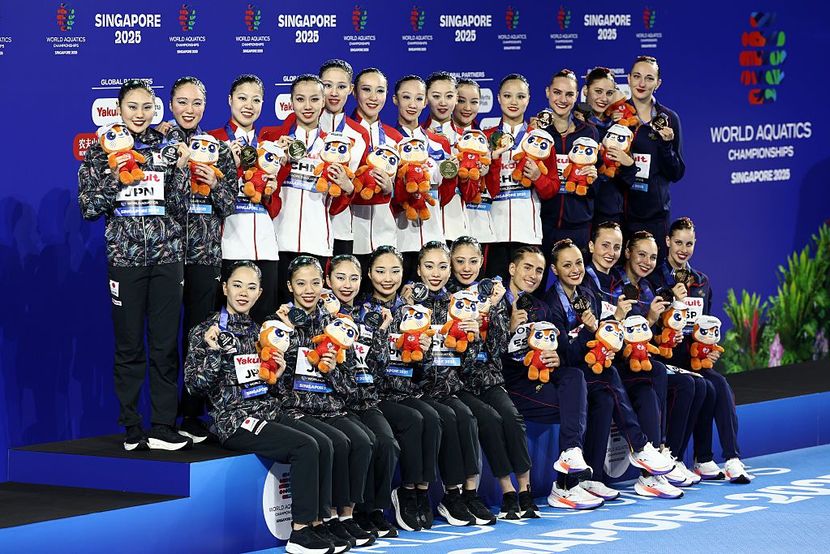
China captured its fourth consecutive world championship title in the Team Free event on Sunday by reprising the “Gravitation” routine it used en route to winning Olympic team gold last year in Paris. This time, however, five of the eight swimmers were new. Japan and Spain finished 2-3.
SINGAPORE – China won gold in Team Free on Sunday, which meant that 19-year-old Xu Huiyan claimed her second world championship gold medal in two days. Runner-up Japan took its third straight world championship silver, and third-place Spain made the podium in Team Free for the first time in 12 years.
What most fans didn’t realize was that China had lost two key players after the World Cup Super Final in Xi’an in June, including Zhang Yayi. After Zhang’s injury, China’s coach Zhang Xiaohuan said “it really left us in a fix. She hurt her leg on 9 July, and on 10 July, three days before we left for Singapore, Feng Yu stepped up to take Yayi’s place in the Team Free. This was not an easy task.
“There was so much anxiety. Our captain, [Feng], had to remember the routine in a day, and step on stage within days. I felt so moved looking at her before the competition. Even while other girls were resting, she would spend the time visualising the routine. She’s never let us in on how anxious she must have felt, or how much pressure she felt.
“This proves that Team China is made up of athletes who can withstand even the greatest of tests,” coach Zhang said, “so I felt really proud of this team.” It would be the last time China performed the Gravitation routine.
But the biggest buzz of the night – for novelty, innovation, and storytelling – went to Spain. Had it not been for a late hybrid base mark in its riveting “Insanity” routine – the most difficult of the night – it may have easily overtaken Japan for silver. The premise behind Spain’s program was that insanity is often criticized until a person keeps fighting, succeeds, and then becomes a genius. In other words, every genius has been called crazy at some point. Spain’s routine personified that. It was offbeat from the get-go. The swimmers dove in with their arms at their sides, looking unusually stiff. Later, their feet quivered as if they’d been electrified, and – perhaps most spectacular – was an impossible-looking throw in which the flyer was caught upside down on her head, landing scalp first into the palm of her teammate’s hand.
In the end, though, Japan’s precision prevailed. Despite earning the lowest impression score among Sunday’s medalists, Japan’s remarkably sharp legwork in its Bushido routine contributed to its 334.7232 total, just 13.7547 points behind China and 13.5904 points ahead of Spain.
Asked what it would take to beat China, Japan’s Tomoka Sato said even more “synchronisation, height and compactness of our patterns.” How long it would take to reach that level, the 23-year-old Sato said, “I can’t imagine.”
The US, the 2024 Olympic silver medalist, placed fourth with a new Body-themed routine that made its debut at the World Cup in Markham, Canada, in May.
Worth noting: Team free routines last 3 minutes 30 seconds, making them the longest of the 11 artistic swimming programs at the world championships. China earned $50,000 US for the win.
Up Next:
Monday’s gold medal double-header will feature the Men’s Solo Free final (at 14:00pm Singapore time) and the Team Technical routine (at 18:30pm Singapore).